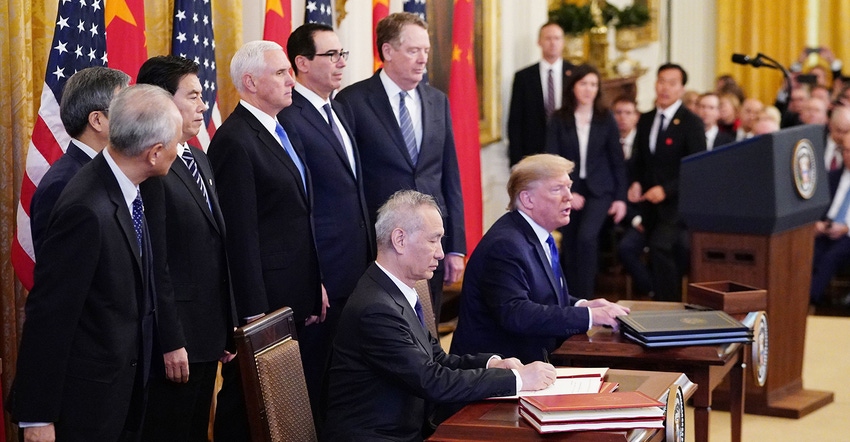A wet firecracker or a ticking bomb?
Enjoy the run of prosperity, but do not expect it to last forever.
January 20, 2020

Depending on your perspective, the recently — and long-awaited — Phase 1 deal with China that was signed and unveiled could chart a path to prosperity or be another case of more fluff than substance. In my opinion, it was a bit short on details and apparently the market was equally uninspired with hog futures sagging in the wake of the announcement. Click here for a brief recap of the agricultural components.
It is easier to be a cynical critic on the sidelines rather than amend to reality and adjust your plan. The famous deep-thinker Mike Tyson one time commented regarding his upcoming fight with Evander Holyfield that, "Everyone has a plan until they get punched in the mouth." Maybe this is our proverbial knuckle sandwich that has to be digested as it was not what many had hoped for in the agreement.
It seems to me that the pessimism is the easiest and, perhaps, incorrect conclusion. Consider this:
The agreement references "market-based" purchases. This could be read as a negotiating gambit for China to hold back on its commitment or as a pressure relief valve to prevent them from having to buy just to meet a quota. Umm … wouldn't it be a good thing if pork prices were high enough to make the latter argument? I would be thrilled if we rallied to a level that invoked this clause, we are nowhere near "too high" of a price right now, we have some of the cheapest pork on the planet. The bigger issue to me is the allowance of the free market system of potential buyers to behave in their best interests. The tariffs on U.S. pork moving to China are still in place except for the designated state-owned enterprises. We have shared in this space previously that there is a difference between tariffs and an embargo. Opening up the buying is, perhaps, a key to success rather in conjunction with or as an alternative to tariff reduction.
It is true that China has reneged on agreements and slow played conflict resolution in the past. This agreement provides an alternative to the delay tactics in addition to the recent removal of the World Trade Organization as an even slower vehicle to modify behavior. Remember that late in 2019 the United States finally achieved its goal of neutering the WTO via refusing to appoint judges to the Geneva-based organization, a practice that began with George W Bush and was embraced by the Obama administration, crippling the process via its own rules and reducing the full seven-member panel to less than the minimum number of three necessary to render a verdict. It was largely agreed that the WTO needed reform, it was the United States that was the most vocal and acted to effectively end the 25-year-old agreement. In its absence, countries will have to argue among themselves for dispute resolution and the United States is likely in a position of power in this new order. The Phase 1 agreement has language that creates a one-on-one fight, not the ability to hide behind a panel. This is a positive step, in my opinion.
Two years is nothing to the Chinese long-term plans. African swine fever put them in a difficult scenario. I suspect they will accept their punishment in the short-term for the privilege of executing on their strategic mission. This agreement and this economic condition wherein we may seemingly have the upper hand on a temporary basis will not last. This is a window in time for U.S. pork producers to prosper in the world market (as of this writing, the 12-month forward-look on the CME indicates roughly $30 per head profits — not bad) and it will not be open forever. Steve Meyer did a good job last week of superimposing projected harvest numbers relative to the most recent Hogs and Pigs report, that will make you pay attention if you are listening correctly. Enjoy the run of prosperity, but do not expect it to last forever.
The bottom-line on the Phase 1 deal is this: the United States "won" on many fronts (intellectual property protection may be the biggest component) and the ag sector appears to be a winner on a tempered basis with a lot of promise for the next two years if everything plays out in reality as it is written on paper.
Outside of the Chinese news, we and the Mexicans quietly signed the U.S.-Mexico-Canada Agreement and are awaiting the anticipated reciprocation by the Canadians upon their return from holiday on Jan. 27. This, too, is positive news that gets overwhelmed by outside news, impeachment proceedings in this case. Maintaining positive trade relations with our direct neighbors is good by almost any assessment.
The grain market had its own version of a wet firecracker with a stocks and yield report that did almost nothing to the market. The USDA shocked most by raising corn and bean yields and made many adjustments to the balance sheet. So many, in fact, that it is hard to project what has a firm foundation and what is subject to further revision. I believe the take-home from the grain report is good news for the livestock industry. There is no immediate and pending threat of higher input prices in the foreseeable future.
Comments in this column are market commentary and are not to be construed as market advice. Trading is risky and not suitable for all individuals. Joseph Kerns
Source: Joseph Kerns, who is solely responsible for the information provided, and wholly owns the information. Informa Business Media and all its subsidiaries are not responsible for any of the content contained in this information asset.
About the Author(s)
You May Also Like





